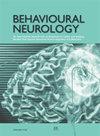阿米苏必利治疗后精神分裂症症状加重患者肠道微生物群的初步分析
IF 2.7
4区 医学
Q2 CLINICAL NEUROLOGY
引用次数: 4
摘要
越来越多的证据表明,肠道微生物群与精神分裂症的潜在发病机制有关。然而,氨硫pride对肠道微生物群的影响尚未明确。本研究旨在分析阿米硫pride治疗的精神分裂症症状加重患者住院四周期间的细胞因子和粪便微生物群。本研究采用16S rRNA焦磷酸测序和生物信息学分析对精神分裂症患者粪便进行分析,以确定肠道微生物组组成和空腹外周血细胞因子。我们发现,接受氨硫pride治疗的精神分裂症患者的肠道微生物组成在属水平上发生了明显的变化,短链脂肪酸产生菌(Dorea和Butyricicoccus)水平增加,致病菌(放线菌和卟啉单胞菌)水平降低,但Desulfovibrio水平仍然很高。基于微生物组的功能分析,我们还发现了丁酸盐代谢的显著下调。治疗后,发现白细胞介素- (IL-) 4水平升高,IL-6水平降低。我们的发现扩展了先前的工作,并提出了氨硫pride治疗精神分裂症的可能药理学机制,它通过肠道微生物组的调解起作用。本文章由计算机程序翻译,如有差异,请以英文原文为准。
Analysis of Gut Microbiota in Patients with Exacerbated Symptoms of Schizophrenia following Therapy with Amisulpride: A Pilot Study
Evidence is mounting that the gut microbiome is related to the underlying pathogenesis of schizophrenia. However, effects of amisulpride on gut microbiota are poorly defined. This study was aimed at analyzing cytokines and fecal microbiota in patients with exacerbated symptoms of schizophrenia treated with amisulpride during four weeks of their hospital stay. In the present study, feces collected from patients with schizophrenia were analyzed using 16S rRNA pyrosequencing and bioinformatic analyses to ascertain gut microbiome composition and fasting peripheral blood cytokines. We found that patients undergoing treatment of schizophrenia with amisulpride had distinct changes in gut microbial composition at the genus level, increased levels of short-chain fatty acid-producing bacteria (Dorea and Butyricicoccus), and reduced levels of pathogenic bacteria (Actinomyces and Porphyromonas), but the level of Desulfovibrio was still high. We also found a significant downregulation of butanoate metabolism based on functional analysis of the microbiome. After treatment, elevated levels of interleukin- (IL-) 4 and decreased levels of IL-6 were found. Our findings extend prior work and suggest a possible pharmacological mechanism of amisulpride treatment for schizophrenia, which acts via mediation of the gut microbiome.
求助全文
通过发布文献求助,成功后即可免费获取论文全文。
去求助
来源期刊

Behavioural Neurology
医学-临床神经学
CiteScore
5.40
自引率
3.60%
发文量
52
审稿时长
>12 weeks
期刊介绍:
Behavioural Neurology is a peer-reviewed, Open Access journal which publishes original research articles, review articles and clinical studies based on various diseases and syndromes in behavioural neurology. The aim of the journal is to provide a platform for researchers and clinicians working in various fields of neurology including cognitive neuroscience, neuropsychology and neuropsychiatry.
Topics of interest include:
ADHD
Aphasia
Autism
Alzheimer’s Disease
Behavioural Disorders
Dementia
Epilepsy
Multiple Sclerosis
Parkinson’s Disease
Psychosis
Stroke
Traumatic brain injury.
 求助内容:
求助内容: 应助结果提醒方式:
应助结果提醒方式:


